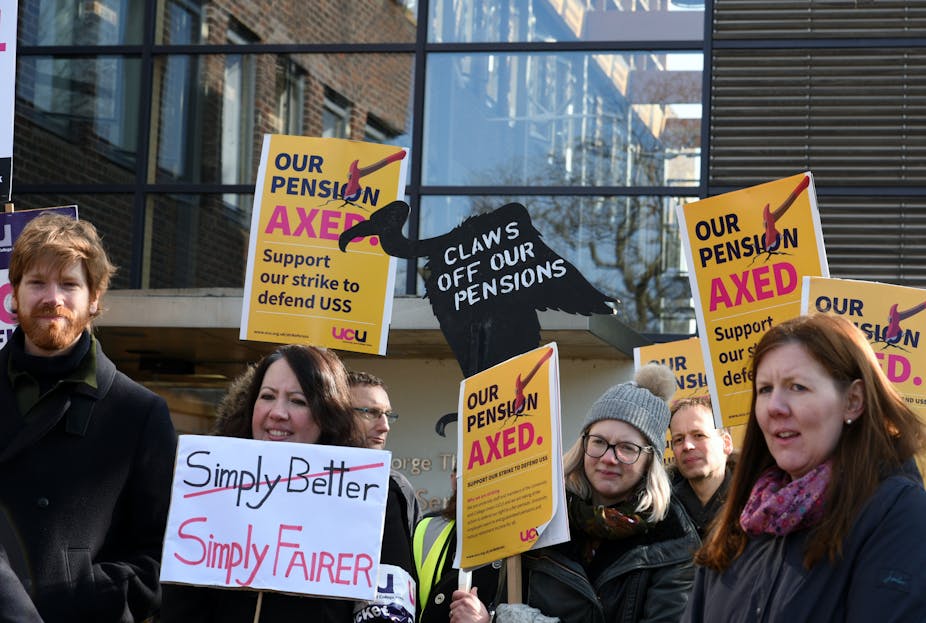With pension funds in a state of crisis, many organisations are trying to change the costly schemes they have in place, including the umbrella group for UK universities, Universities UK, and telecoms company BT. But while the changes offer respite from unaffordable pensions, they can have other long-term consequences for organisations if they are not handled well.
In particular, there can be unexpected knock-on effects for the employees whose schemes are being tinkered with. In our recent research we identified how organisational changes, including those to pensions, can transform previously loyal, long-serving employees into perpetrators of counterproductive behaviour at work. This can range from time-wasting in the office to active sabotage, such as divulging confidential information.
We found that changes to pensions had a disproportionate impact on older workers. This group may often have forgone opportunities to earn more money earlier in their careers to remain with an employer, due to the future benefits of their pension scheme. Over time, they may have become increasingly locked into this decision, with too much invested in their pensions to easily walk away.
But this means they are an expensive resource for organisations, and less likely to be considered in voluntary redundancy schemes. Using interviews and survey methods, we discovered how this group of employees pose an insider threat to an organisation.
Negative emotions
When change is imposed from above, it affects an employee’s ability to navigate their own destiny. It can destroy long cherished retirement plans, leaving people feeling frustrated, angry and distrustful towards their employer.
These negative emotions form the basis of subsequent behaviour that could pose a threat. Unwanted or unexpected change often results in poor communication and increasingly entrenched labour disputes, which serve to further exacerbate negative feelings on both sides.
Our analysis showed how these experiences can trigger a perceived breach in the psychological contract between these staff members and their employer. Employees dwell on the previous, now broken, promises made to them. They go on to question all kinds of actions from the past, even those formerly considered legitimate, which affects their trust levels in the organisation in the future. This undermines the integrity of their employer, and marks the beginning of cynicism about the motives of the organisation.
Our analysis showed cynicism can be enhanced when leaders receive disproportionately different reward and benefits packages. This is currently the case with many organisations in the UK – hence anger over vice chancellor pay in the university sector.
Fear and passive threat
As people start to feel angry and distrustful, some seek to redress perceived injustices through their own negative actions. This can take the form of active anti-social behaviour and aggression towards colleagues or leaders, and through passive responses such as uncooperative behaviour. They begin to morally disengage, seeing their behaviour either as reasonable or harmless.

Of course, an organisation’s leadership can also be negatively impacted by pension changes, rather than solely being the deliverer of bad news to employees. Our analysis showed that disgruntled managers can be responsible for creating a work environment in which staff feel protected or at least facilitated in their counterproductive work behaviour. In this way, a climate of insider threat can be amplified to spread more widely across the organisation.
Acrimonious dispute, as well as making some people feel angry, can increase feelings of vulnerability and fear in others. As a result, people stop speaking up when they notice the transgressive behaviour of others. This makes them “passive threats” within the organisation.
Turning a blind eye is just one way they might disengage from their workplace and their colleagues. The long-term impact of fear is to leave people feeling depleted and out of control. Through omission and mistakes, they too can become an insider threat, often without even noticing.
The long-term consequences of industrial disputes and changes to employees’ cherished futures reduces their job satisfaction, which is an important protector against counterproductive work behaviour.
Both formal dispute and general employee disgruntlement can be a final trigger, leading to some leaving an organisation. This then opens up the possibility of additional external threats for the employer when, for example, employees share confidential information with outsiders or seek to damage the organisation’s external reputation.
So, while pension changes are important to the long-term viability of organisations, ongoing, badly-handled disputes can have significant unintended consequences. These can surpass financial considerations and strike at the very security of an organisation.

